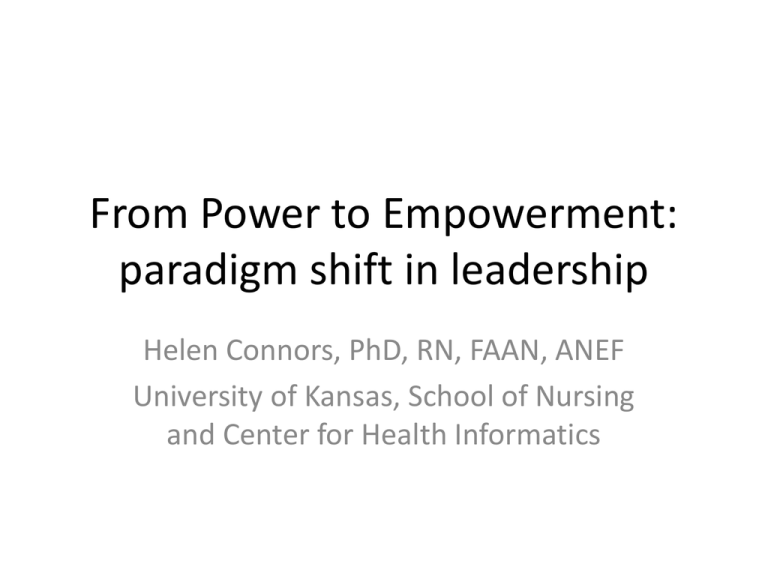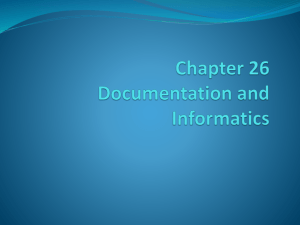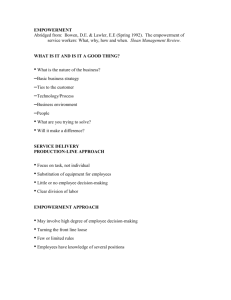From Power to Empowerment: paradigm shift in leadership
advertisement

From Power to Empowerment: paradigm shift in leadership Helen Connors, PhD, RN, FAAN, ANEF University of Kansas, School of Nursing and Center for Health Informatics Objectives • Discuss a historical review of nurses’ power • Describe the kinds of power nurses need for optimum impact • Create a culture of empowerment Looking Back to Improve the Future Mother of Modern Nursing In attempting to arrive at the truth, I have applied everywhere for information, but in scarcely an instance have I been able to obtain hospital records fit for any purposes of comparison. If they could be obtained they would enable us to decide many other questions besides the ones alluded to. They would show the subscribers how their money was being spent, what amount of good was really being done with it, or whether the money was not doing mischief rather than good.” Florence Nightingale (1863). Longman, Green, Longman, Roberts and Green: Notes on Hospitals, 1863, London, p. 176 First Nurse Informatician Lillian Wald & Mary Breckenridge Power • Having control, influence, or domination over something or someone. • The ability to get things done, to mobilize resources, to get and use whatever is needed to meet one’s goals. • Includes - caring practices by nurses which are used to empower patients (Benner, 2001). Putting Nurse’s Power in Context • Social and Cultural – Women’s work – Domestic role – Done in private • Educational – Taught in hospitals – By physicians – Multiple entry levels Multiple Levels of Power • Macro-level: systems, organizational, societal – Professional associations – Nursing schools • Meso-level: Power also operates in – City, county, state, and institution decisions about resources and regulations – Large bureaucratic organizations, corporations, ethnic or minority groups • Micro-level: – Interpersonal or relational levels Types of Power • Legitimate – a position of power • Informational(Expert) –comes from ones experiences, skills, knowledge • Coercive – conveyed through fear • Referent- comes from being trusted and respected • Charisma – power legitimized by a leader’s exceptional characteristics Domains of Power • Content – ability to act according to one’s knowledge and judgement (autonomy) • Context – control of practice/work environment • Competence of nursing practice- education and expertise Power and Empowerment Power Empowerment Types of Empowerment • Structural Empowerment – managerial practices • Personal Empowerment – psychological state Kanter RM. Men and Women of the Corporation. 2nd ed. New York, NY: BasicBooks; 1993 Structural Empowerment • Access to resources • Access to all information to get the job done as well as about the organization • Support for job responsibilities and decision making • Opportunity for professional growth and development Kanter RM. Men and Women of the Corporation. 2nd ed. New York, NY: BasicBooks; 1993 Personal Empowerment • • • • Confidence in one’s own abilities Access to power, authority and influence Ability to make one’s own decisions Employing your strength when dealing with others • Having a sense of connectedness and kindness Kanter, 1993 The Empowered Nurse • Nurses should practice to the full extent of their education and training (transforming practice). • Nurses should be full partners, with physicians and other health professionals, in redesigning health care (transforming leadership) • What does an empowered nurse look like? (IOM, The Future of Nursing: Leading change, advancing health, 2010) The Empowered Student • Nurses should achieve higher levels of education and training through improved education systems that promotes seamless academic progression (transforming education). • How can we empower students? (IOM, The Future of Nursing: Leading change, advancing health, 2010) The Empowered Patient • The public is increasingly aware that they must assume a greater role in health care issues. • Do you think patients want to be empowered? • What do patients/consumers need to be empowered? Empowered Patient APP Facts from Pew Research Center • 87% of U.S. adults use the internet. • 72% of internet users say they looked online for health information. • Most commonly-researched topics are specific diseases or conditions; treatments or procedures; and doctors or other health professionals. • 60% of U.S. adults say they track their weight, diet, or exercise routine. http://www.pewinternet.org/fact-sheets/health-fact-sheet/ Mind-Mapping For use with Table Discussions Competence Autonomy Mind-Mapping For use with Table Discussions Just Culture Management Leadership Mind-Mapping For use with Table Discussions Caring Positive nursing image Mind-Mapping For use with Table Discussions Life-long learning Professional development Mind-Mapping For use with Table Discussions Boards Community outreach Mind-Mapping For use with Table Discussion Mange/Lead Community Outreach Positive image KEY ACTIONS First 3 Years Prof Dev Autonomy Mind-Mapping For use with Table Discussion Mange/Lead Community Outreach Positive image SUCCESS FACTORS 3 –Year Priorities Prof Dev Autonomy Group Work






